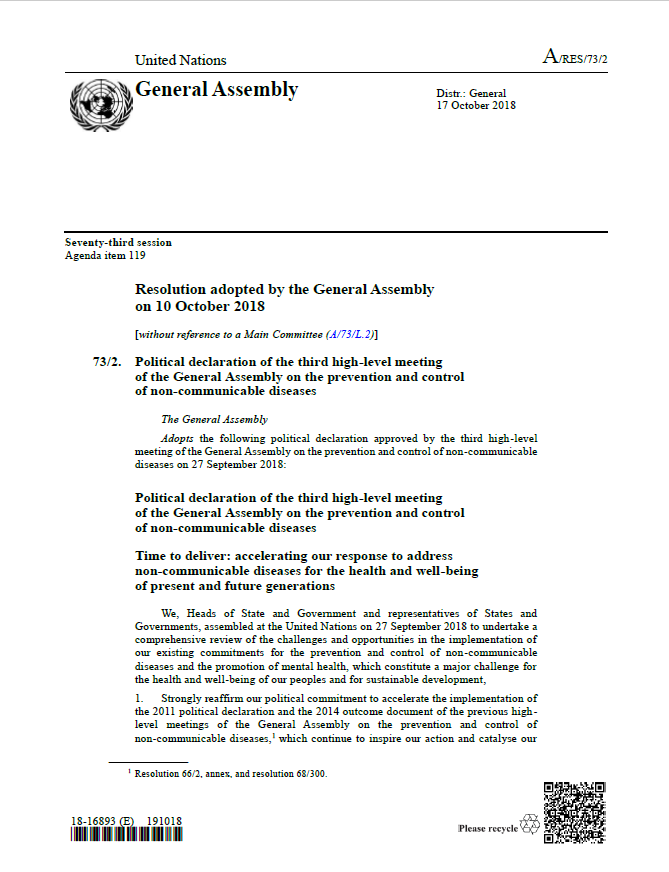2018 Political declaration of the third HLM on NCDs
Analysis of precedential value
This declaration is the product of the third High-Level Meeting on the Prevention and Control of Non-Communicable Diseases in September 2018. It was adopted by the UN General Assembly without a general vote the following month. The General Assembly is the preeminent governing body of the UN system and consists of all 193 UN Member States.
Used as precedent
key and vulnerable populations
“Acknowledge the impact of non-communicable diseases on older persons, which is of particular concern, given the growing proportion of older persons and recognizing that they have an increased risk of multiple non-communicable diseases, which constitutes a major challenge for health systems.” (paragraph 13)
“Implement, according to own-country-led prioritization, a set of cost-effective, affordable and evidence-based interventions and good practices, including those recommended by the World Health Organization, for the prevention and control of non-communicable diseases, that can be scaled up across populations to promote health, treat people with non-communicable diseases and protect those at risk of developing them, with a particular emphasis on the needs of those in vulnerable situations.” (paragraph 19)
“Take measures to better prepare the health systems to respond to the needs of the rapidly ageing population, including the need for preventive, curative, palliative and specialized care for older persons, taking into account the disproportionate burden of non-communicable diseases on older persons, and that population ageing is a contributing factor in the rising incidence and prevalence of non-communicable diseases.” (paragraph 29)
gender equality
“Acknowledge that mainstreaming a gender perspective into the prevention and control of non-communicable diseases is crucial to understanding and addressing the health risks and needs of women and men of all ages, giving particular attention to the impact of non-communicable diseases on women in all settings.” (paragraph 14)
societal enablers
“Reaffirm the primary role and responsibility of governments at all levels in responding to the challenge of non-communicable diseases by developing adequate national multisectoral responses for their prevention and control, and promoting and protecting the right of everyone to the enjoyment of the highest attainable standard of physical and mental health, and underscore the importance of pursuing whole-of-government and whole-of-society approaches, as well as health-in-all-policies approaches, equity-based approaches and life-course approaches.” (paragraph 15)
human rights
“Take the necessary measures to recognize the right of everyone to the enjoyment of the highest attainable standard of physical and mental health across the life course, in respecting human rights obligations and addressing the specific health needs of children, women, older persons, persons with disabilities and others who are more vulnerable to non-communicable diseases.” (paragraph 28)
access to health products
“Promote increased access to affordable, safe, effective and quality medicines and diagnostics and other technologies, reaffirming the World Trade Organization Agreement on Trade-Related Aspects of Intellectual Property Rights (TRIPS Agreement), as amended, and also reaffirming the 2001 Doha Declaration on the TRIPS Agreement and Public Health, which recognizes that intellectual property rights should be interpreted and implemented in a manner supportive of the right of Member States to protect public health and, in particular, to promote access to medicines for all, and notes the need for appropriate incentives in the development of new health products.” (paragraph 36)
key population and community leadership
“Promote meaningful civil society engagement to encourage Governments to develop ambitious national multisectoral responses for the prevention and control of non-communicable diseases, and to contribute to their implementation, forge multi‐stakeholder partnerships and alliances that mobilize and share knowledge, assess progress, provide services and amplify the voices of and raise awareness about people living with and affected by non-communicable diseases.” (paragraph 42)
